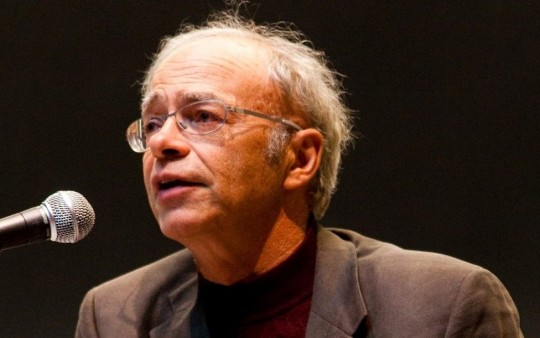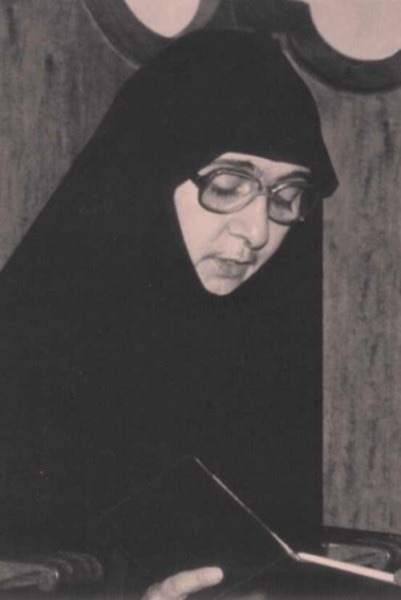Text


Jérôme Lejeune (left) and Peter Singer (right)
Similarly, the preference utilitarian reason for respecting the life of a person cannot apply to a newborn baby. Newborn babies cannot see themselves as beings who might or might not have a future, and so cannot have a desire to continue living. For the same reason, if a right to life must be based on the capacity to want to go on living, or on the ability to see oneself as a continuing mental subject, a newborn baby cannot have a right to life. Finally, a newborn baby is not an autonomous being, capable of making choices, and so to kill a newborn baby cannot violate the respect for autonomy.
Peter Singer
We need to be clear: the quality of a civilization can be measured by the respect it has for its weakest members. There is no other criterion.
Jérôme Lejeune
First, while there has been a growing awareness of human dignity, many misunderstandings of the concept still distort its meaning. Some people propose that it is better to use the expression "personal dignity" (and the rights "of the person") instead of "human dignity" (and the rights "of man") since they understand a "person" to be only "one who is capable of reasoning." They then argue that dignity and rights are deduced from the individual's capacity for knowledge and freedom, which not all humans possess. Thus, according to them, the unborn child would not have personal dignity, nor would the older person who is dependent upon others, nor would an individual with mental disabilities.
On the contrary, the Church insists that the dignity of every human person, because it is intrinsic, remains "in all circumstances." The recognition of this dignity cannot be contingent upon a judgment about a person's ability to understand and act freely; otherwise, it would not be inherent in the person, independent of the individual's situation, and thus deserving unconditional respect. Only by recognizing an intrinsic and inalienable dignity in every human being can we guarantee a secure and inviolable foundation for that quality. Without any ontological grounding, the recognition of human dignity would vacillate at the mercy of varying and arbitrary judgments. The only prerequisite for speaking about the dignity inherent in a person is their membership in the human species, whereby "the rights of the person are the rights of man."
Dignitas Infinita, or "On Human Dignity" (§24)
#Catholicism#Christianity#humanity#personhood#human dignity#Dignitas infinita#Peter Singer#Jerome Lejeune#philosophy#prolife#disability#euthanasia#abortion#ableism#infanticide
4 notes
·
View notes
Text
Hooking his fingers into cracks in the stone, he saw the sturdy bone of Grandpa Lundberg’s wrists, thick as fenceposts; felt in his chest the heart of Gramma Beauvais, strong and steady in her nineties. Funny, he thought, how his grandparents had always tried to parse him out. He resented their urge to divide his DNA [… o]nly here had he come to understand that he was not a battleground -to be divided and conquered by his grandparents- but a garden, where each person who’d contributed to his existence longed to see something that of themselves had taken root and grown.
- Mary Doria Russel (Children of God: A Novel, pages 418-419)
5 notes
·
View notes
Photo

Steller’s jay stealing sweetener packets
National Geographic photo contest 2011
69K notes
·
View notes
Text
Patience, however, is truly a divine virtue. God is patient not because He is "indulgent," but because He sees the depth of all that exists, because the inner reality of things, which in our blindness we do not see, is open to Him. The closer we come to God, the more patient we grow and the more we reflect that infinite respect for all beings which is the proper quality of God.
--Rev Dr. Alexander Schmemann: Great Lent - Journey to Pascha
27 notes
·
View notes
Text

Munin at Yosemite National Park, enjoying a view of the river.
(Munin is my African raven.)
710 notes
·
View notes
Text

"The question of forgiveness is not a moral issue. We do not forgive because it is the 'correct' thing to do. We forgive because it is the true nature of the life in Christ. As Dostoevsky described it: it is Paradise. In the same manner, the refusal to forgive, the continuation of blame, recrimination, bitterness, etc., are not moral failings. They are existential crises - drawing us away from the life of Christ and Paradise, and ever deeper into an abyss of non-being.
We who expect to receive such great mercy at the time of our own death - should we not extend the same mercy to all while we are yet among them?"
~Fr. Stephen Freeman, Forgive Everyone for Everything
(Art: "Crucifix," by Eric Gill 1917)
#Jesus Christ#Crucifixion#mercy#forgiveness#Divine Mercy of Jesus#Stephen Freeman#Fyodor Dostoyevsky#heaven#Kingdom of God#Imitatio Dei#wrath
84 notes
·
View notes
Text
[T]he concept of human dignity is also occasionally misused to justify […] the ability to express and realize every individual preference or subjective desire[…] This perspective identifies dignity with an isolated and individualistic freedom that claims to impose particular and subjective desires and propensities as "rights" to be guaranteed and funded by the community. […] Viewed through the lens of the relational character of the person, human dignity helps to overcome the narrow perspective of a self-referential and individualistic freedom that claims to create its own values regardless of the objective norms of the good and of our relationship with other living beings. Indeed, there is an ever-growing risk of reducing human dignity to the ability to determine one's identity and future independently of others, without regard for one's membership in the human community. In this flawed understanding of freedom, the mutual recognition of duties and rights that enable us to care for each other becomes impossible.
Dignitas infinita, or "On Human Dignity" (§25, 26)
#Catholicism#Christianity#human rights#duty#human dignity#individualism#Dignitas infinita#community#responsibility#freedom#isolation
7 notes
·
View notes
Text
A Trinitarian Conviction for Human Dignity
The Church proclaims the equal dignity of all people, regardless of their living conditions or qualities. This proclamation rests on a threefold conviction, which —in light of the Christian faith— gives human dignity an immeasurable value and reinforces its intrinsic demands.
The Indelible Image of God
The first conviction, drawn from Revelation, holds that the dignity of the human person comes from the love of the Creator, who has imprinted the indelible features of His Image on every person (cf. Gen. 1:26). The Creator calls each person to know Him, to love Him, and to live in covenantal relationship with Him; while calling the person also to live in fraternity, justice, and peace with all others. In this perspective, dignity refers not only to the soul but also to the person as an inseparable unity of body and soul. Accordingly, dignity is also inherent in each person's body, which participates in its own way in being in imago Dei (in the Image of God) and is also called to share the soul's glory in the divine beatitude.
Christ Elevates Human Dignity
The second conviction follows from the fact that the dignity of the human person was revealed in its fullness when the Father sent His Son, who assumed human existence to the full: "In the mystery of the Incarnation, the Son of God confirmed the dignity of the body and soul which constitute the human being" [Dignitas Personae, §7]. By uniting Himself with every human being through His Incarnation, Jesus Christ confirmed that each person possesses an immeasurable dignity simply by belonging to the human community; moreover, He affirmed that this dignity can never be lost. By proclaiming that the Kingdom of God belongs to the poor, the humble, the despised, and those who suffer in body and spirit; by healing all sorts of illnesses and infirmities, even the most dramatic ones, such as leprosy; by affirming that whatever is done to these individuals is also done to him because he is present in them: in all these ways, Jesus brought the great novelty of recognizing the dignity of every person, especially those who were considered "unworthy."
This new principle in human history —which emphasizes that individuals are even more "worthy" of our respect and love when they are weak, scorned, or suffering, even to the point of losing the human "figure"— has changed the face of the world. It has given life to institutions that take care of those who find themselves in disadvantaged conditions, such as abandoned infants, orphans, the elderly who are left without assistance, the mentally ill, people with incurable diseases or severe deformities, and those living on the streets.
A Vocation to the Fullness of Dignity
The third conviction concerns the ultimate destiny of human beings. After the Creation and the Incarnation, Christ's Resurrection reveals a further aspect of human dignity. Indeed, "the dignity of this life is linked not only to its beginning, to the fact that it comes from God, but also to its final end, to its destiny of fellowship with God in knowledge and love of Him. In light of this truth, Saint Irenaeus qualifies and completes his praise of man: 'the glory of God' is indeed 'man, living man,' but 'the life of man consists in the vision of God' [Evangelium Vitae, §38b].
Consequently, the Church believes and affirms that all human beings —created in the Image and likeness of God and recreated in the Son, who became Man, was crucified, and rose again— are called to grow under the action of the Holy Spirit to reflect the glory of the Father in that same image and to share in eternal life (cf. Jn. 10:15-16, 17:22-24; 2 Cor. 3:18; Eph. 1:3-14). Indeed, "Revelation . . . shows forth the dignity of the human person in all its fullness."
- Dignitas infinita, or "On Human Dignity" (§17-21)
#Christianity#Catholicism#human dignity#God the Father#Imago Dei#Genesis#Jesus Christ#Logos#Incarnation#daridranarayan#compassion#Kingdom of God#charity#humanitarianism#Holy Spirit#sanctification#theosis#Saint Irenaeus#glory#Gospel of John#2 Corinthians#Letter to the Ephesians#Holy Trinity#salvation#redemption#Dignitas infinita#personhood
6 notes
·
View notes
Text
the idealized version of my tomorrow self will fix this
80K notes
·
View notes
Text

“Are we assailed by a sense of grievance? Then let us respond by saying: "Lord Jesus Christ, have mercy on me" "I give thanks, my God, that I have suffered for You. How greatly did You suffer for me?" and let us ponder on our Lord's limitless love for us and meditate on the examples from the life of Christ. If we persevere with this line of thought, other thoughts will flee.”
-Gerontissa Theosemni.
50 notes
·
View notes
Text
“To be with G-d is really to be involved with some enormous, overwhelming desire, and joy, and power which you cannot control, which controls you. I conceive of my own life as a journey toward something I do not understand, which in the going toward, makes me better. I conceive of G-d, in fact, as a means of liberation and not a means to control others. Love does not begin and end the way we seem to think it does. Love is a battle, love is a war; love is a growing up.”
— James Baldwin, In Search of a Majority (1960)
2K notes
·
View notes
Text
Russian Orthodox has an old liturgical rite called “brother-making” for vowing friendship certainly a W for the Russian Orthodox Church
124 notes
·
View notes
Text
All human beings possess [the] same intrinsic dignity, regardless of whether or not they can express it in a suitable manner.
Dignitas finita, or "On Human Dignity" (§15)
13 notes
·
View notes
Text
A Philosophical Definition of Personhood
Finally, it is worth mentioning that the classical definition of a person as an "individual substance of a rational nature" clarifies the foundation of human dignity.
As an "individual substance," the person possesses ontological dignity (that is, at the metaphysical level of being itself). Having received existence from God, humans are subjects who "subsist" — that is, they exercise their existence autonomously.
The term "rational" encompasses all the capacities of the human person, including the capacities of knowing and understanding, as well as those of wanting, loving, choosing, and desiring; it also includes all corporeal functions closely related to these abilities. "Nature" refers to the conditions particular to us as human beings, which enable our various operations and the experiences that categorize them; in this sense, nature is the "principle of action."
We do not create our nature; we hold it as a gift and we can nature, develop, and enhance our abilities. By exercising the freedom to cultivate the riches of our nature, we grow over time. Even if a person is unable to exercise these capabilities due to various limitations or conditions, nevertheless the person always subsists as an "individual substance" with a complete and inalienable dignity. This applies, for instance, to an unborn child, an unconscious person, or an older person in distress.
Dignitas infinita, or "On Human Dignity" (§9)
#Catholicism#Christianity#philosophy#metaphysics#personhood#definitions#human dignity#Dignitas infinita#existence#God
0 notes
Photo

St. Rita, Patroness for impossible causes, ca. 1900
1K notes
·
View notes
Text

The Jesus Prayer is thus an affirmation of faith in Jesus Christ as alike truly divine and fully human. He is the Theanthropos or 'God-man', who saves us from our sins precisely because He is God and man at once. Man could not come to God, so God has come to man -- by making Himself human. In His outgoing or 'ecstatic' love, God unites Himself to His creation in the closest of all possible unions, by Himself becoming that which He has created. God, as man, fulfils the mediatorial task which man rejected at the fall. Jesus our Saviour bridges the abyss between God and man because He is both at once. As we say in one of the Orthodox hymns for Christmas Eve, 'Heaven and earth are united today, for Christ is born. Today has God come down to earth, and man gone up to heaven.'
-- Kallistos Ware, The Orthodox Way
#prayers#Jesus Prayer#Incarnation#Jesus Christ#Christ the Mediator#Kallistos Ware#love#agape#admirabile commercium
71 notes
·
View notes
